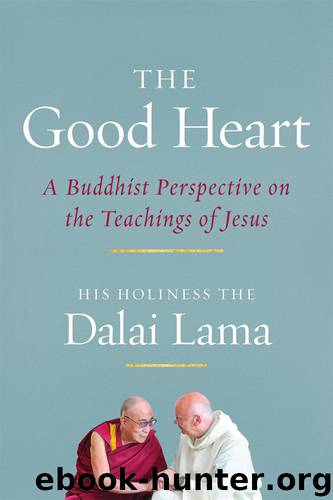The Good Heart by Dalai Lama

Author:Dalai Lama
Language: eng
Format: epub
Publisher: Wisdom Publications
Published: 2016-01-31T16:00:00+00:00
8
FAITH
John 12:44–50
Father Laurence: Welcome again, Your Holiness. In this session, His Holiness will be reading and commenting on the last two Gospel passages, both from the Gospel of Saint John. The first concerns faith and the second contains the account of the Resurrection.
Jesus proclaimed: “To believe in me, is not to believe in me but in him who sent me; to see me, is to see him who sent me. I have come into the world as light, so that no one who has faith in me should remain in darkness. But if anyone hears my words and disregards them, I am not his judge; I have not come to judge the world, but to save the world. There is a judge for anyone who rejects me and does not accept my words; the word I have spoken will be his judge on the last day. I do not speak on my own authority, but the Father who sent me has himself commanded me what to say and how to speak. I know that his commands are eternal life. What the Father has said to me, therefore, that is what I speak.”
[John 12:44–50]
THESE PASSAGES FROM the Gospel of John seem to be an important section of the Bible. When I read them, the first thing that strikes me is a close resemblance to a particular passage in the Buddhist scriptures in which the Buddha states that whoever sees the principle of interdependence sees the Dharma and whoever sees the Dharma sees the Tathāgata, the Buddha. The implication is that through understanding the nature of interdependence, through understanding Dharma, you will understand the true nature of buddhahood. Another point this raises is that simply having a visual perception of the Buddha’s body does not correspond to actually seeing the Buddha. In order to actually see the Buddha, you must realize that the dharmakāya — the Truth Body of the Buddha — is suchness. This is what it means to actually see the Buddha. Similarly, these passages point out that it is through the historical personification of the Christ that you are actually experiencing the Father that he represents. Christ is the gateway to this encounter with the Father.
Here again we see the metaphor of light, which is a common image in all the major religious traditions. In the Buddhist context, light is particularly associated with wisdom and knowledge; darkness is associated with ignorance and a state of misknowledge. This corresponds to the two aspects of the path: there is the method aspect, which includes such practices as compassion and tolerance, and the wisdom, or knowledge, aspect, the insight penetrating the nature of reality. It is the knowledge, or wisdom, aspect of the path that is the true antidote to dispelling ignorance.
Since these passages also seem to point out the importance of faith in one’s spiritual practice, I think it might be useful here to give some explanation of the Buddhist understanding of faith. The Tibetan word for faith is day-pa, which perhaps might be closer in meaning to confidence, or trust.
Download
This site does not store any files on its server. We only index and link to content provided by other sites. Please contact the content providers to delete copyright contents if any and email us, we'll remove relevant links or contents immediately.
The Way of Zen by Alan W. Watts(6587)
Ego Is the Enemy by Ryan Holiday(5400)
The Art of Happiness by The Dalai Lama(4118)
The Book of Joy by Dalai Lama(3965)
Why Buddhism is True by Robert Wright(3439)
Spark Joy by Marie Kondo(3292)
Shift into Freedom by Loch Kelly(3189)
Happiness by Matthieu Ricard(3036)
A Monk's Guide to a Clean House and Mind by Shoukei Matsumoto(2901)
The Lost Art of Good Conversation by Sakyong Mipham(2638)
The Meaning of the Library by unknow(2557)
The Unfettered Mind: Writings from a Zen Master to a Master Swordsman by Takuan Soho(2290)
The Third Eye by T. Lobsang Rampa(2255)
Anthology by T J(2201)
Red Shambhala by Andrei Znamenski(2180)
The Diamond Cutter by Geshe Michael Roach(2056)
Thoughts Without A Thinker: Psychotherapy from a Buddhist Perspective by Epstein Mark(2007)
Twilight of Idols and Anti-Christ by Friedrich Nietzsche(1886)
Advice Not Given by Mark Epstein(1873)
